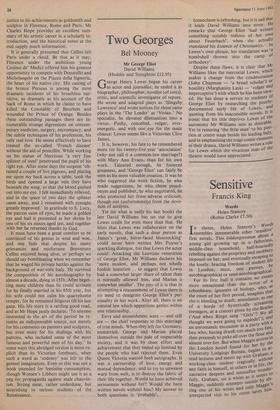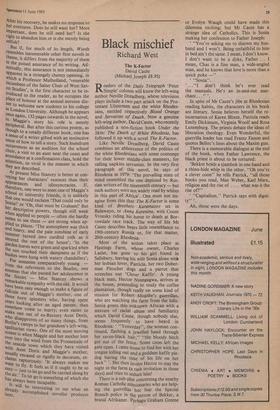Sensitive
Francis King
Words Helen Stancey (Robin Clarke £7.50)
Itheme, Helen Stancey's Words n resembles innumerable other 'sensitive' first novels. This bildungsroman about a young girl
middle-class household, half-heartedly
growing up in a fatherless, rebelling against the propriety and snobbery imposed on her, and eventually escaping thein London, to lonely, bracing freedom of student life autobiographical icaml or semi autobiographical. For its first half it contains no events more sensational than the terror of a schoolmate, ignorant of biology, who, at the onset of her first period, imagines that she is bleeding to death; attendance, as one of a horde of hysterically screaming teenagers, at a concert given by the Beatles ('And when Ringo sang "Girls"!vve all thought we were going to exploder); and an unromantic encounter at a party with a boy who, having drunk too much too fast, then proceeds to puke all over the floor and i almost over her. But when Maggie arrives in the London hostel found for her by the University Lodgings Bureau, begins to at- tend lectures and meets up with Graham, a working-class student tragically without any faith in himself, in others or in life, the narrative deepens and intensifies wonder- fully. Graham, on a whim as it seems .t0 Maggie, suddenly attempts suicide by slit- ting one of his wrists and only Maggte him. unexpected visit to his room saves
After his recovery, he makes no response to her overtures. Does he still want her? More important, does he still need her? Is she right to abandon him or is she merely being selfish?
But if, for much of its length, Words .resembles innumerable other first novels in theme, it differs from the majority of them in the poised assurance of its writing. Ad- mittedly, this assurance is not immediately apparent in a strangely clumsy opening, in which a Professor Mulholland, 'venerable incumbent of the Salter Chair of West Sax- on Studies', is the first character to be in- troduced to the reader, as he occupies the Place of honour at the annual autumn din- ner to welcome new students to his college at London University. Although he appears once again, 132 pages onwards in the novel, in Maggie's story his role is merely Peripheral. But after this curious proem, as though to a totally different book, one has a sense of a writer gifted with an instinctive sense of how to tell a story. Such humdrum occurrences as an audition for the school choir, a visit to an aunt near the coast and attendance at a confirmation class, hold the attention, so vivid is the manner in which they are described. At present Miss Stancey is better at con- veying her characters' essences than their appearances and idiosyncracies. If, therefore, one were to meet one of Maggie's school or university friends, it is unlikely that one would exclaim 'That could only be Sonia!' or 'Oh, that must be Graham!' But her descriptive powers, though still weak when applied to people — often she hardly seems to see them — are strong when ap- plied to places. 'The atmosphere was thick and heavy, and the pale sunshine of early summer turned into curdled yolk as it entered the rest of the house'; 'In the garden leaves were green and sparkled when the sun touched their dampness as if the bushes were hung with watery chandeliers';
For someone comparatively young from the references to the Beatles, one assumes that she passed her adolescence in the Sixties — Miss Stancey shows a remarkable sympathy with the old. It would have been easy enough to make a figure of ridicule out of Maggie's mother, one of those born spinsters who, having spent Years looking after an aged parent, then somehow come to marry; even easier to make one out of ex-Rectory Aunt Doris,
who disapproves of so many things, from Butlin's camps to her grandson's left-wing, egalitarian views. One of the most moving
scenes is when Maggie and her mother lean over into the wind from the Promenade of the seaside town which they have visited with Aunt Doris and Maggie's mother, usually encased so rigidly in decorum, ex- claims rapturously: 'It always makes me want to fly. It feels as if it ought to be so easy _ just to let go and be carried along by the air,' To let go is something of which she has always been incapable. It will be interesting to see what an
al
ready accomplished novelist produces next.











































 Previous page
Previous page